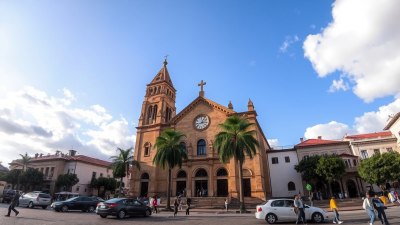How Sports Travel Connects People from Different Backgrounds
Discover the power of sports travel in bridging cultural gaps and uniting diverse communities.

Image created with Flux Schnell
In an increasingly globalized world, the intersections of culture, identity, and community have become more pronounced, and one of the most significant avenues for this exploration is sports travel. Sports travel not only promotes physical activity and competition but also acts as a powerful tool for human connection across varied backgrounds.
As individuals travel for sports—be it to watch an event, participate in tournaments, or engage in recreational activities—they immerse themselves in different cultures. This immersion fosters understanding, respect, and lasting friendships among participants from diverse regions. From local leagues to international championships, the shared love for sports serves as a common language that transcends barriers.
The Shared Experience of Competition
Competing in sporting events allows athletes to exhibit their skills and dedication while simultaneously appreciating the talents of others. When athletes compete on international platforms, they experience a unique blend of rivalry and camaraderie. The adrenaline of competition often turns into moments of mutual respect, as competitors recognize each other's hard work and effort.
Furthermore, the experience of competing in a different country exposes athletes to new training methods, perspectives, and customs associated with the sport. This exchange of knowledge and practices reinforces not only athletic prowess but also cultural appreciation among participants.
Building Friendships Through Sports
A significant aspect of sports travel is the friendships formed during these experiences. Whether it's a local team traveling abroad for a competition or a fan attending an international match, the shared interest in sports creates instant bonds. Fans from different walks of life—united by their passion for a sport—can share stories, experiences, and cultures during their travels.
Social media has further revolutionized this connectivity. Fans now engage with one another before, during, and after events, creating a digital community that spans continents. The friendships formed on these platforms often lead to real-life meetups at sporting events, enhancing the sense of global connection.
Cultural Exchange Through Sports Events
Sports travel also facilitates cultural exchange. Major sporting events like the Olympics, FIFA World Cup, and the Commonwealth Games draw participants and fans from around the globe, creating a melting pot of cultures. These events present opportunities to showcase local customs, traditions, and culinary delights, allowing visitors to immerse themselves in the local culture.
Through sports, spectators often learn about the cultural significance behind various rituals, ceremonies, and traditions associated with specific sports. For instance, in rugby, the pre-match haka performed by New Zealand's All Blacks reflects Maori culture and values. Such experiences highlight the interconnectedness of sports and culture, inviting participants to learn and respect various backgrounds.
The Role of Local Communities in Sports Travel
Local communities play a vital role in shaping the experiences of sports travelers. Engaging with the community allows travelers to get an authentic sense of the local culture and its connection to sports. Local sporting events provide an opportunity for visitors to blend in with the community and participate in grassroots activities.
Community involvement also fosters volunteerism and creates a sense of belonging among travelers. Many sporting events rely on volunteers from within the local community to help with various tasks, which allows travelers to connect with locals and contribute to event success. This symbiotic relationship enriches the travel experience, paving the way for understanding and friendship.
Sports Tourism and Economic Development
Sports travel has significant implications for economic development as well. Cities and countries that host major sporting events benefit from increased tourism, which stimulates the local economy. Hotels, restaurants, and shops experience a surge in business as sports enthusiasts flock to witness the events.
Moreover, the investment in sports infrastructure often leads to long-term benefits for the community. Improved facilities can attract more events and foster engagement among local populations. Local athletes gain access to better training grounds, and schools can use these facilities for various programs, significantly benefiting the overall community.
Encouraging Inclusivity and Accessibility in Sports Travel
In recent years, there has been a significant push towards inclusivity and accessibility in sports travel. Organizations and governing bodies are increasingly recognizing the need to ensure that sports events cater to individuals with disabilities and those from underrepresented groups.
This focus on inclusivity breaks down barriers and encourages individuals from all backgrounds to participate in sports. The more inclusive the atmosphere in sports travel becomes, the more diverse the experiences and relationships formed are. Initiatives such as adaptive sports programs and accessibility measures at venues allow a broader range of participants to engage, fostering deeper connections across varying backgrounds.
The Future of Sports Travel
As globalization continues to evolve, the role of sports travel in connecting diverse cultures will become even more pronounced. With the rise of technology, virtual reality, and enhanced accessibility, individuals are exploring innovative ways to participate in and experience sports without geographical constraints.
Furthermore, the post-pandemic world has adjusted views on travel, with many looking for meaningful connections as part of their journeys. Sports travel presents a unique opportunity to create lasting relationships and learn about various cultures, enhancing the overall experience beyond just sports.
As we move forward, the sports community will likely prioritize initiatives that promote equality, inclusivity, and engagement. Emphasizing diversity in athlete representation, fostering community engagement, and advocating for environmental sustainability will shape the landscape of sports travel for years to come.
In conclusion, sports travel serves as a powerful conduit for bridging cultural gaps and connecting people from different backgrounds. Through shared experiences, competition, and friendship, sports travel fosters a sense of unity and belonging that strengthens community bonds. As we embrace the future of sports travel, the opportunities for cross-cultural engagement and understanding remain limitless.











